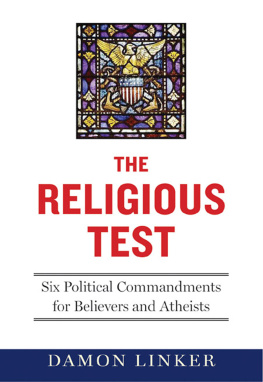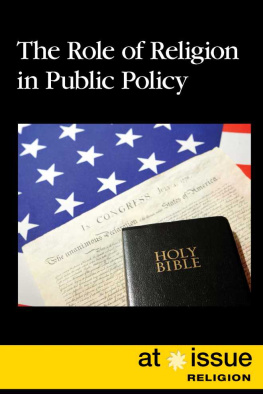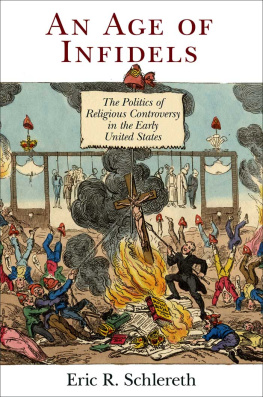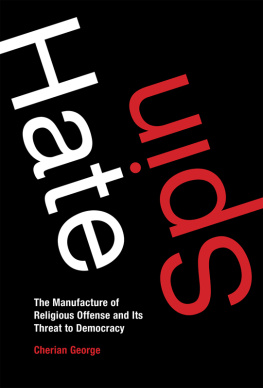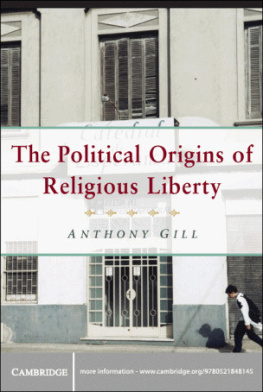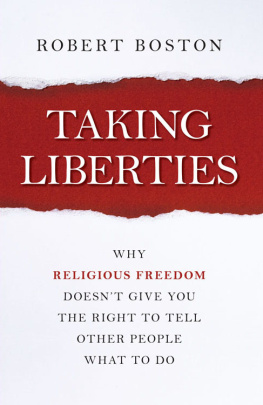The Religious Test
Why We Must Question the Beliefs of Our Leaders
Damon Linker

W. W. NORTON & COMPANY
NEW YORK LONDON
Copyright 2010 by Damon Linker
All rights reserved
Excerpts from Aubade and Faith Healing from
Collected Poems by Philip Larkin, Faber and Faber Ltd.
Excerpts from Aubade and Faith Healing from Collected Poems by Philip Larkin.
Copyright 1988, 2003 by the Estate of Philip Larkin. Reprinted by
permission of Farrar, Straus and Giroux, LLC.
For information about permission to reproduce selections from this book, write to Permissions, W. W. Norton & Company, Inc., 500 Fifth Avenue, New York, NY 10110
Library of Congress Cataloging-in-Publication Data
Linker, Damon, 1969
The religious test: why we must question the beliefs of our leaders / Damon Linker.1st ed.
p. cm.
Includes bibliographical references.
ISBN: 978-0-393-08055-1
1. Religion and politicsUnited States. 2. Religious toleranceUnited States.
3. United StatesReligion. I. Title.
BL2525.L554 2010
201'.72dc22
2010020647
W. W. Norton & Company, Inc.
500 Fifth Avenue, New York, N.Y. 10110
www.wwnorton.com
W. W. Norton & Company Ltd.
Castle House, 75/76 Wells Street, London W1T 3QT
For Mark and Kaitlyn
The Religious Test
Introduction
O n the evening of September 12, 1960, John F. Kennedy delivered a speech to the Greater Houston Ministerial Association in which he attempted to defuse a controversy that threatened to derail his presidential campaigna controversy flowing from the fact of his Catholic faith. In his remarks, Kennedy worked to reassure voters worried about him becoming the nations first Catholic president, but he also tried to shame his audience, reminding them that Article VI of the US Constitution explicitly stipulates that no religious Test shall ever be required as a Qualification to any Office or public Trust under the United States. Whereas religious test oaths had been the norm in Europe, compelling office-seekers to affirm a particular religion and excluding members of (in Kennedys words) less favored churches from the exercise of political power, the American constitutional framers had established a political system in which such tests were prohibited. To treat a politicians religious beliefs as politically relevant was thus an affront to our forefathers no less than to Americas noblest civic traditionsthe ones Kennedy himself had fought for in the South Pacific and his brother had died for in Europe during the Second World War. The candidates meaning was plain: American ideals demanded that his Catholicism be placed off-limits from public scrutiny.
The speech was an enormous successand not just because it helped Kennedy win the election. Its more enduring legacy was to convince journalists and other critics not to raise questions about the political implications of specific theological beliefs. In the years since the address, analyzing the dangers of generic religion to the nations political life has remained perfectly acceptable, but evaluating the political predilections of particular religious traditions has come to be seen as simpleminded bigotry. And so we have learned to sayand thinknothing about the subject.
That is a problem, as Kennedy himself implicitly acknowledged in his speech, which did not simply deny the legitimacy of theologically based objections to his candidacy but also answered those objections, directly and forthrightlymaking clear that he knew his primary loyalty as president must be to the American people and not to the Vatican. He was right to tackle these concerns head-on. Yes, anti-Catholic prejudice contributed to the nations concerns about Kennedys campaign, but prejudice was not their only source. The political history of pre-Vatican II Catholicismwith its overt hostility to democracy, liberalism, toleration, modernity, and religious error, as well as its emphasis on the absolute authority of the pope in matters of faith and moralsraised perfectly legitimate questions about what it would mean for the United States to elect a Catholic to the nations highest office. Indeed, widespread apprehensiveness among the American people about such questions showed that they took religious differences more seriously than we do, and that they intuitively understood an important truth that we often forget todaynamely, that not all theological assumptions are equally compatible with the political order of the United States.
Kennedys response to these concerns was to state as bluntly as possible that his faith would play no role in his thinking and actions as president. As he memorably put it, I do not speak for my church on public mattersand my church does not speak for me. If Kennedys position had become the norm in the years since his speechif Americans reliably bracketed their religious convictions when fulfilling their civic dutiesthen silence about the spiritual beliefs of our fellow citizens and prospective leaders would be perfectly acceptable and appropriate. But alas, the nation has moved in the opposite direction over the past half-century. During these years, and especially since the rise of the religious right in the late 1970s, traditionalist religious believersthose who devote their lives most fully to God and interpret the world in light of a comprehensive system of theological ideas about the nature of realityhave explicitly repudiated Kennedys stance. As far as many of these devout believers are concerned, citizens and public figures should put their faith at the core of their civic identities and campaigns for political office.
This demands a responseand a new kind of religious test. Unlike the tests proscribed by the Constitution, this one will not threaten to exclude members of specific churches from political participation using formal (or legal) means. In our time of heightened sectarian tensionswhen devout believers and secularists increasingly perceive each other to be stationed on opposite sides of a cultural chasmit is crucially important that the country remain committed to the ideal of active citizenship for all. But defending that ideal does not oblige us to treat the religious views of our fellow citizens with indifference. Quite the reverse: with religion playing an unprecedentedly prominent role in our public life, it is imperative that individuals learn how to do the hard and dirty work of distinguishing between politically benign and politically toxic forms of religion. That is precisely what the religious test contained in this book will help them to doto think wisely, deeply, and above all critically about the forms of religion that have come to play a leading role in our politics and culture.
My examination of traditionalist religions diverse challenges to politics in the United States should not be taken as a sign of antireligious animus. Devout believers have contributed to Americas moral and political development in numerous ways. Quakers, Methodists, and members of other Protestant denominations were inspired by their faith to take a risky stand against slavery in the early nineteenth century, long before most Americans opposed it. Protestant advocates of the Social Gospel helped to inspire such crucially important early-twentieth-century political movements as Progressivism and the New Deal. Numerous religious groups, especially black Protestant churches in the South, launched the civil rights movement of the 1950s and 1960s. Catholic activists have worked tirelessly to alleviate poverty while also contributing in decisive ways to the antiwar and antideath penalty movements of recent decades. And then there is the indisputable connection between piety and philanthropy. As many studies have shown, regular churchgoers of every denomination contribute significantly more of their income to charity than their secular counterparts.

